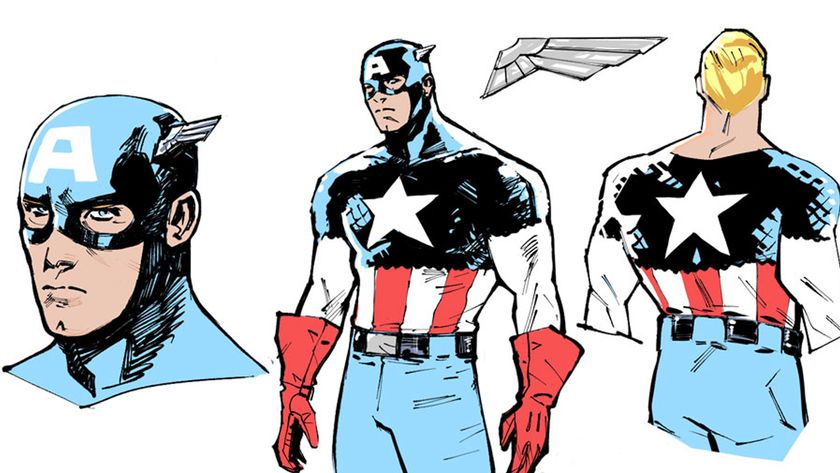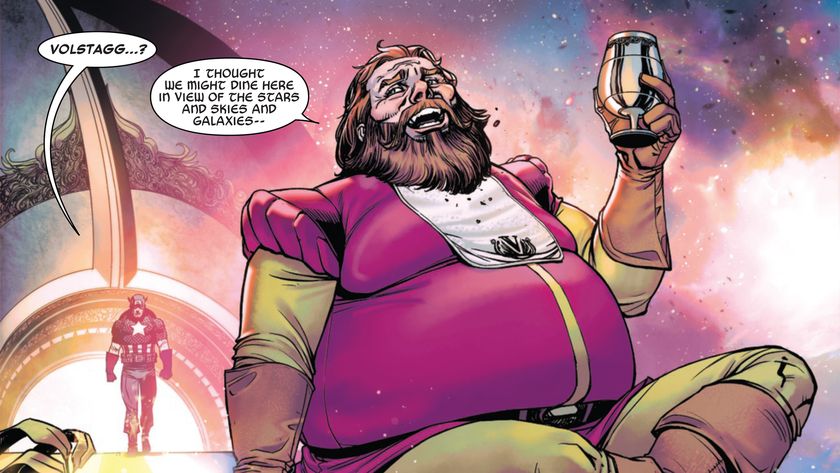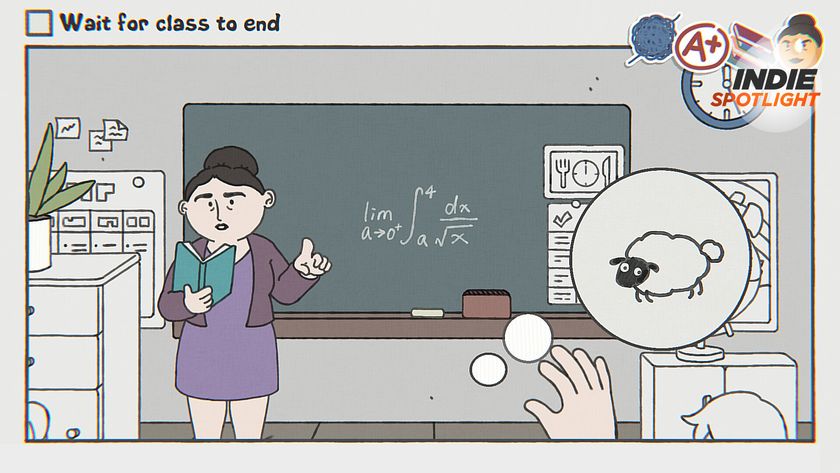Boy Scouts in the apocalypse: Inside Scout's Honor with writer David Pepose
When the world is in ashes, who will survive to forge the future? What if it was…the Boy Scouts?!
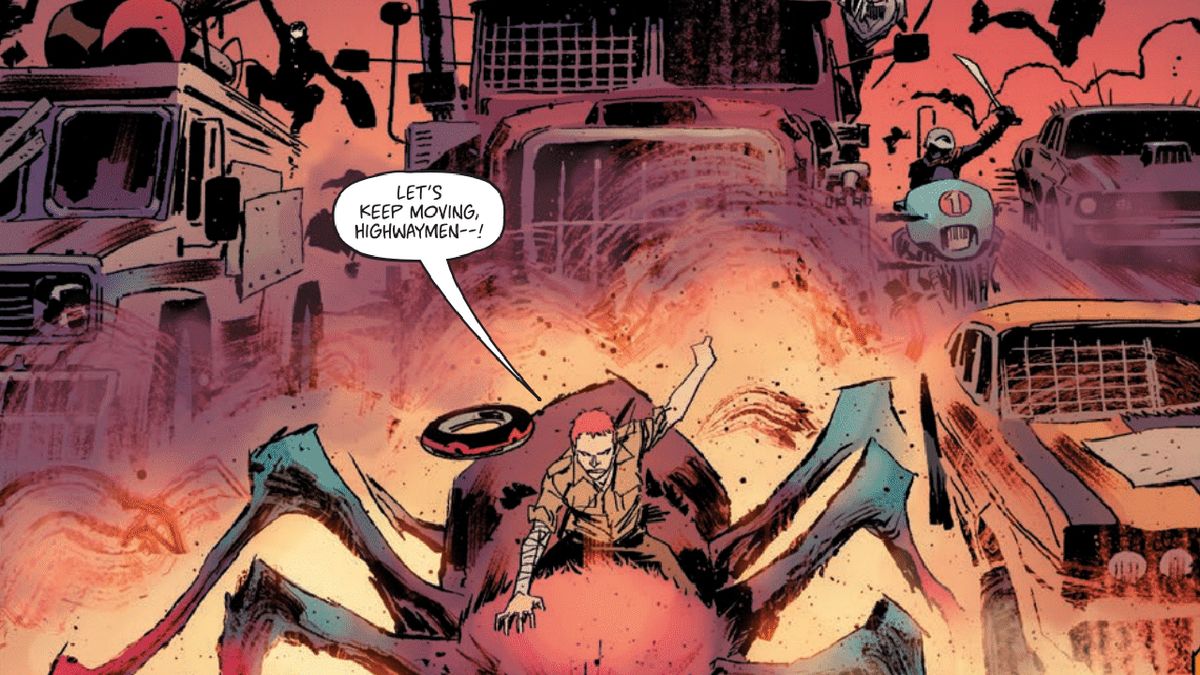
In AfterShock Comics' Scout's Honor, only the strong survive the badlands of the post-nuclear future…and the strongest are the Ranger Scouts, male children trained to be the best from 'sacred' documents from their past - old Boy Scout manuals passed down from generation to generation.
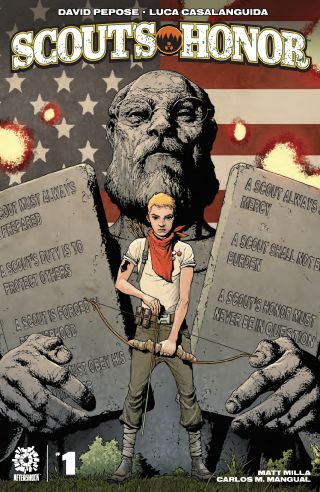
The twist of Scout's Honor is that the best of their number has a secret; their star student Kit is actually a woman, hiding her gender in order to join their all-male ranks. But as she keeps her personal secret, Kit discovers that the Ranger Scouts themselves have a dark secret that would change everything for her and her fellow survivors in this strange new world.
With the five-issue series in stores now and a Scout's Honor collection going on sale September 8, Newsarama spoke to writer David Pepose from the vantage point of us - and the readers - having read it all, to take in a 'big picture' view of the series. The writer spoke about his and Luca Casalanguida's initial plans for the series, how they evolved, and how they found this story's own true north in this story about being lost and finding yourself.
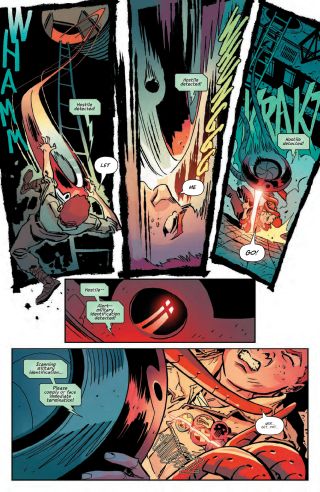
Newsarama: David, how did you first come up with the premise for Scout's Honor?
David Pepose: For those who don't know what our book is about, Scout's Honor is about a cult that has risen from the ashes of a nuclear apocalypse… and their bible is an old Boy Scout manual. Our series then jumps ahead a few hundred years later, as one of the Ranger Scouts of America's young initiates makes a chilling discovery that will cause her to lose her religion and embark on a dangerous quest for the truth.
This story was inspired by a variety of sources ranging from Mad Max to The Path, but one of the biggest was watching my younger brothers as Boy Scouts. On the inside, it was all about camaraderie and learning practical skills and spending time with your pals, but on the outside, seeing the pageantry and costumes and bylaws couldn't help feel a little… well, cult-like.
But I think the heart of this series was inspired by the real world - everything from Scientology to the Catholic priest scandals to my own upbringing. While I wasn't raised in a cult, I grew up in a particularly conservative house, both politically and religiously - it wasn't until I left home that I realized a lot of what I had believed wasn't as true as I thought.
Comic deals, prizes and latest news
Get the best comic news, insights, opinions, analysis and more!
I think we've all had that moment where the rug is pulled out from underneath us - and for me, my political and spiritual reawakening was very disorienting, but wound up shaping who I am today.
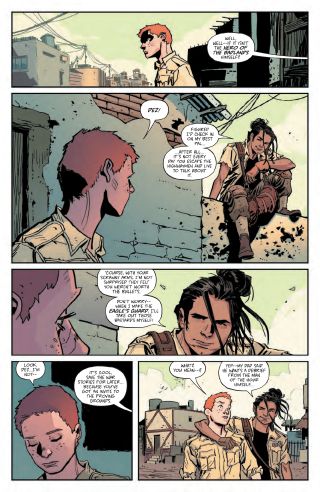
Nrama: Explain some of the details of how this society functions. How much backstory/worldbuilding did you have to do?
Pepose: Spanning more than 200 years after nuclear armageddon, the Ranger Scouts of America have taken the Ranger Scout Survival Handbook and mutated into a patriarchal and militarized cult of survivalists. History is like a game of telephone, and staples like merit badges or the Scout Laws have taken on altogether religious connotations - even the Ranger Scouts' founder Doctor Jefferson Hancock has been deified as a prophet-messiah figure, his Scout Laws being transformed into a sort of Ten Commandments centuries after his death.
As a practicing Jew, I was raised in a religion that was built on a wide spectrum of interpretation - to be honest, I think that spirit of literary analysis is the foundation of why I became a writer. And so, finding the religion in both the post-apocalyptic imagery and the Boy Scout lore wound up being some of the most rewarding elements of this entire book for me.
Items like the Switchblade - long mutated from a Swiss Army knife into gigantic multi-bladed claymores - transformed into something like a Bar Mitzvah. Even the Merit Badges have their own deep religious meanings beyond the tactical benefit of knowing what skills your platoon has just by looking at them - the Explosives Merit Badge, for example, winds up digging into the Ranger Scouts' explosive creation myth, but also keys into their obsession with being prepared for any eventuality. After all, if you don't know and respect the bomb, it might consume you next.
Nrama: How did you develop the main character of Kit?
Pepose: Kit is a young Ranger Scout initiate, and perhaps the embodiment of every good thing the organization represents - but there's a twist. In this patriarchal, hyper-masculine cult, only men are allowed to serve, and as such, Kit has had to conceal her identity as a woman in order to pursue her calling as a Ranger Scout. That leaves a real emotional friction with every choice she makes - she always has to have her guard up, always has to make sure she doesn't slip.
Unfortunately, Kit is a true believer who's going to have a wrecking ball go through her worldview. But as someone who has a strong moral compass no matter what, she's going to wind up having to navigate not just the dangers of the Colorado Badlands, but also being on the wrong side of all the other Ranger Scouts she's trusted her whole life.
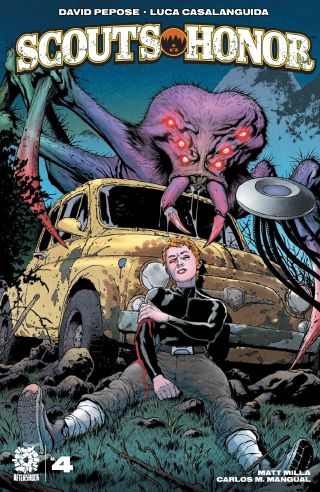
Nrama: Kit and Dez have a particularly complex relationship – both in terms of the issues of gender identity and orientation, things that go back to Elizabethan drama, but also in terms of the conscious and unconscious competition between the two. How did you conceive that relationship, and what was more important for you to convey about it?
Pepose: Kit and Dez's dynamic evolved a lot over the course of developing this story - the rivalry between the two had been baked in since the beginning, but having their relationship fracture over their respective gender identity and orientation felt like the perfect way to explore the toxic masculinity of the Ranger Scouts in a more personal and emotional way. If Kit is a woman trying to navigate this culture, what's it like for a member of the LGBTQ community like Dez, who is essentially the closeted son of the local pastor?
Honestly, out of everything in this series, Kit and Dez's relationship is probably one of my favorite elements of Scout's Honor. I think it humanizes both of them in a really important way, and it shows that even a so-called antagonist in this story is just as much a prisoner of this society as our heroine. I always felt a lot of sympathy towards both characters, they were just a blast to write.
Nrama: How did Luca come on board for the project? What's your collaboration like?
Pepose: Luca Casalanguida is such a terrific artist, someone who is able to play with that post-apocalyptic grit, but never forgets the clean emotional moments that makes Scout's Honor really crackle.
What's great is that I've actually been familiar with Luca's work for years - I was a big fan of his work on James Bond over at Dynamite, to the point where I had reached out to him years ago for another project - so I was thrilled with my editors Christina Harrington and Mike Marts told me he was looking for his next project.
I honestly couldn't be more impressed with not just how polished Luca's work is, but how fast he's been able to produce pages. He's done such incredible design work, really fleshing out characters like Kit and Dez, but even the actual Ranger Scout compound looks particularly menacing thanks to Luca's eye.
Nrama: Did the story grow and change any as you worked on it? That is, what elements became more prominent to you as it went from the initial idea to the finished product?
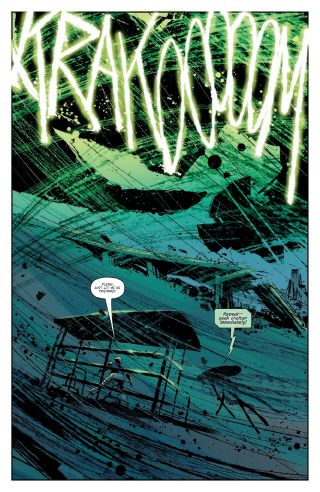
Pepose: For sure. The idea of making Kit a woman actually came fairly late in the initial development process - when AfterShock asked me to develop this particular concept about a post-apocalyptic Boy Scout cult, my initial thought was… 'Oh man, there's no way a book with all dudes is going to fly in 2019.' But then I realized I could lean into that - it is weird to have a male-driven cult, and what would it be like for a woman to navigate this toxic world?
There were some other elements, as well. The second issue of the series, in particular, was a big one - I actually wrote a much more action-heavy version, which had been approved by editorial… and after sleeping on it for a night, I proceeded to rewrite about 75% of the script the next day. [Laughs]
The second issue actually originally started with the Scout's Prayer that became the centerpiece of Scout's Honor #4, so it all wound up working out in the end.
Nrama: And what's it been like working with AfterShock?
Pepose: It honestly feels like I've come full circle in my career. I've known Mike Marts since I was in college, when I was an intern at DC Comics - and when the Great Recession narrowed my career path significantly, it was Mike that made me realize that DC was the first step on my comics journey, rather than the last.
This is the first I've really worked with a dedicated editorial team, and that's really leveled up my writing and my overall work in a big way. I've never had a creative team match made for me, for example - but Christina and Mike both really worked overtime to make sure Scout's Honor went smooth. Working with AfterShock has been the biggest platform I've had yet, and working with such a welcoming publisher has really inspired me to bring my A-game.
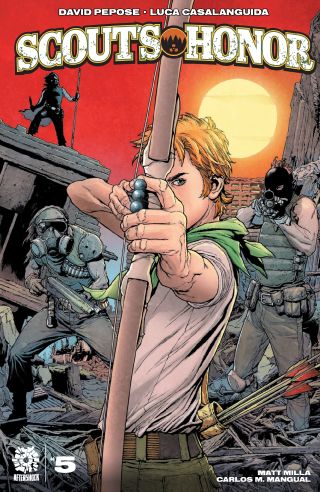
Nrama: What are your favorite post-apocalyptic stories, in different media? A recent favorite of mine is the pair of 'Lot' novellas by Ward Moore, which chronicles what would really happen to a supposedly 'prepared' survivalist.
Pepose: The Fallout series is probably not just my favorite post-apocalyptic series, but maybe my favorite video game series ever - I don't think I'm hiding anything when I say what a huge influence it was on Scout's Honor. Mad Max: Fury Road is an aesthetic miracle, while I remember being so bowled over by how cinematic the Hunger Games novels were even as novels.
Probably a deeper cut is The Postman — the novel, not the film. The idea of items from the old world bringing much-needed meaning to the apocalypse definitely resonates!
Nrama: And what is the overall appeal of the apocalyptic, at least for you?
Pepose: I think part of it is aesthetic — the post-apocalyptic genre is all about finding a new way of survival, and then watching that bend the world around it like a magnet. There's the vehicle-centric Mad Max, the sailing in Waterworld, the Postman… but now having written a few dystopian stories with Scout's Honor and The O.Z., I'm realizing the genre is about fighting for a better world.
2020 was a dystopian year, but if Scout's Honor is about anything, it's that we are capable of turning a corner. And I think by the time this series ends, we will have.
Nrama: What's next for you that you can talk about at this time?
Pepose: For sure, I've got a few other projects in the works — the next installment of THE O.Z. will be hitting Kickstarter soon, while the artwork is steadily trickling in for my sci-fi series Grand Theft Astro, while I'm chiseling away at the scripts for Spencer & Locke 3.
And that's not including a few other projects I'm working on that haven't been announced yet, ranging from comedy to crime, from horror to YA. It's the best kind of busy!
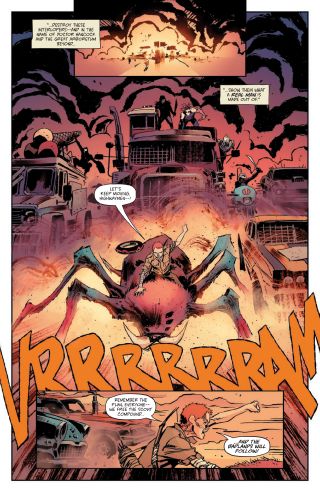
Nrama: Anything else you'd like to talk about that we haven't discussed yet?
Pepose: When you strip down Scout's Honor beyond the post-apocalyptic and Boy Scout tropes, it's ultimately a story about a small conservative town, and what happens to people who don't fit those kinds of rigid societal norms. It's also about how oppressive secrets can be, and how blinding it can be when you're suddenly confronted with the truth.
But ultimately, Scout's Honor is about how do you maintain your spiritual and ethical values while navigating a human institution that can be flawed or even corrupt - because at the end of the day, the most important compass you've got is your heart.
Scout's Honor is available digitally as well as in print. Check out our list of the best digital comics readers for Android and iOS devices.
Zack is a comics journalist, who has written primarily for Newsarama, GamesRadar, and Indy Week. His words have also appeared in The Washington Post, AXS, VOX, The Sports Network, Gambit, and more.
Most Popular





